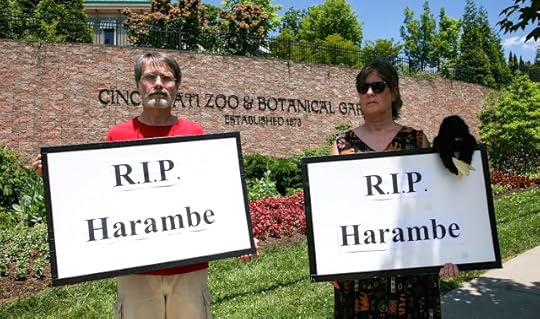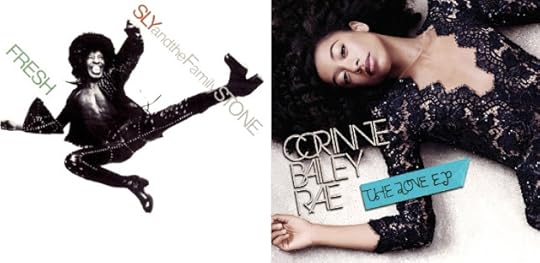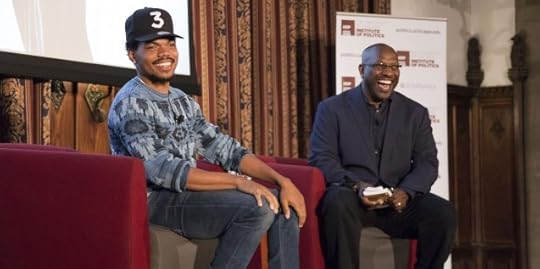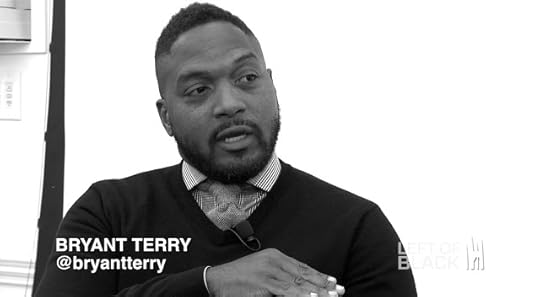Mark Anthony Neal's Blog, page 610
June 4, 2016
Art Briles + Baylor University + America’s Rape Culture by Lawrence Ware
 Art Briles + Baylor University + America’s Rape Cultureby Lawrence Ware | @Law_Ware | NewBlackMan (in Exile)
Art Briles + Baylor University + America’s Rape Cultureby Lawrence Ware | @Law_Ware | NewBlackMan (in Exile)With just under 100 days until the beginning of the college football season, Baylor University has terminated the employment of head coach Art Briles. This is a staggering, almost unprecedented, move. Prior to Briles’ arrival, Baylor had very few 10-win seasons in its storied history. Under his leadership, Baylor installed a groundbreaking ‘wide open’ offense that rocketed the Bears into national prominence. In 2013 and 2014, the team either won or shared the Big 12 title. This is no small feat with Juggernauts like the University of Oklahoma and the University of Texas playing in the same conference. Therefore, the firing of Briles is significant; yet, to be honest, it should have happened years ago.
The university and athletic department failed to take seriously the allegations of sexual assault filed by female students against a number of Baylor football players. Some in the football department went so far as to intimidate young women who came forward. This amounts to a culture of misogyny at Baylor University. Parents were essentially paying tuition to send their daughters to a school where they would neither be protected from nor taken seriously if they reported sexual assault.
To be sure, this is not just a problem among football players. Last year an Association of American Universities survey of over 150,000 students at 27 universities across the nation found that 13.5 percent of female seniors had experienced “non consensual penetration involving physical force or incapacitation." Yet, the issue of sexual assaults involving college football players is a problem. As Mother Jones reports, college football has a 40-year history of mishandling sexual assault allegations. I see two primary reasons for this.
Uneven power dynamics
College football is big business. Oregon, Texas, Michigan, and Alabama reported over 150 million dollars of income in 2014. The vast majority of this revenue is because of the football program. That is why the highest paid state employee in many states is the head coach of the local college football team. When a coach makes more money than the athletic director or college president, it can create a power imbalance where coaches and players at universities are largely above reproach. This was no different at Baylor.
In 2013, the Chronicle of Higher Education reported that Ken Starr (yes, that Ken Starr) was paid an annual salary of $706,426 as president of Baylor University. It was also reported that Ian McCaw (who just resigned as Athletic director amid protests) was paid $498,226. Head coach Art Briles? He was paid $4,000,000. That’s four million dollars for those who want it in words.
In a capitalistic context where one’s labor is commodified and used as a measure of worth, it is clear who is more valuable to the university. Compound this with the fact that Briles is the winningest football coach in school history, a central part of a football program that brings in over $35 million in revenue, and it is clear why this power imbalance exists. Yet, it was only a matter of time before something likes this happened.
Bad Seeds
Sam Ukuwachu was convicted of sexually assaulting a Baylor women’s soccer player in August of 2015. This is not his first run-in with the law. While a player at Boise State, Ukuwachu put his fist through a window and sent threatening messages to a student at the university. This resulted in his being dismissed from the football team. When asked if he knew about this troubling past, Briles emphatically denied being informed. Yet, Chris Patterson, who was a coach at Boise State at the time said:
“After Sam Ukwuachu was dismissed from the Boise State football program and expressed an interest in transferring to Baylor, I initiated a call with coach Art Briles. I thoroughly apprised Coach Briles of the circumstances surrounding Sam’s disciplinary record and dismissal.”But Ukuwachu is not the only player recruited by Baylor that was dismissed from his team for violent behavior. Shawn Oakman was dismissed from the Penn State Nittany Lions in 2011 because of ‘character issues’ including a violent altercation with an employee at an on-campus convenience store. He transferred to Baylor in 2012 where he was investigated for assaulting an ex-girlfriend, but there were no charges filed because the alleged victim declined to press charges.
He was charged with sexual assault last month.
Briles knew he was bringing in players with checkered pasts, but he did so anyway. Why? Because it is his job to win football games—even if that means putting students on campus in harm’s way. The temptation is to turn this into only a sports story. It is not.
An independent report commissioned by Baylor found a “fundamental failure” on the part of the university to effectively implement Title IX as required by the United States Department of Education. This means that there was an institutional wide failure to put the pieces in place to combat sexual assault, sexual harassment, and gender-based microagressions on campus. The university not only took two years to investigate claims of sexual assault against football players, they were also inept at investigating these incidents in general.
Ken Starr failed to allocate enough resources to the Title IX coordinators and, because of this, the university still has investigations pending. Starr’s demotion to chancellor is insufficient. As a Baylor student who survived a sexual assault said assiduously on Outside the Lines, “Starr needs to go.”
While this is not only a sports story—it still forces me to think deeply about my choice to watch college football. While I love and appreciate the competition and athleticism, I am conflicted about the cases of domestic abuse and sexual assault involving football players that local media fail to report and universities sometimes cover-up. We are kidding ourselves if we think this is only a problem at Baylor University.
In March, Nick Saban dismissed defensive tackle Jonathan Taylor after his second arrest for domestic abuse. In December, news of a video surfaced showing University of Oklahoma running back Joe Mixon hitting a young woman. A court battle over this video ensued with the Oklahoma Supreme Court finally ruling that the video is public record. Mixon is, of course, still on the team.
No, these kinds of things don’t just happen at Baylor. From the tendency to blame the victim by asking a sexual assault survivor what they were wearing, to cover-ups on both professional and collegiate teams, rape culture permeates all of American life—no place is truly safe.
+++
Lawrence Ware is an Oklahoma State University Division of Institutional Diversity Fellow. He teaches in OSU's philosophy department and is the Diversity Coordinator for its Ethics Center. A frequent contributor to the publication The Democratic Left and contributing editor of the progressive publication RS: The Religious Left, he has also been a commentator on race and politics for the Huffington Post Live, NPR's Talk of the Nation, and PRI’s Flashpoint. Follow him on Twitter: @law_ware
Published on June 04, 2016 06:34
June 3, 2016
Thomas F. DeFrantz on the Exhibit "Dance! American Art 1830-1960"
 Thomas F. DeFrantz, Chair of African and African American Studies at Duke and author of Dancing Revelations: Alvin Ailey's Embodiment of African American Culture served as an advisor and performer for a new exhibit at the Detroit Institute of Art. DeFrantz explains the significance of the show "Dance! American Art 1830-1960."
Thomas F. DeFrantz, Chair of African and African American Studies at Duke and author of Dancing Revelations: Alvin Ailey's Embodiment of African American Culture served as an advisor and performer for a new exhibit at the Detroit Institute of Art. DeFrantz explains the significance of the show "Dance! American Art 1830-1960."
Published on June 03, 2016 19:49
Adrienne D. Dixson: On Black Girls + Discipline + Schools
 'Researcher Adrienne D. Dixson explains why schools treat students of color and low-income students of color as thought they need to be heavily disciplined.' --
Education Week
'Researcher Adrienne D. Dixson explains why schools treat students of color and low-income students of color as thought they need to be heavily disciplined.' --
Education Week
Published on June 03, 2016 19:41
Politics In Real Life: The Struggle To Pay For College

'Loans and grants often aren't enough to cover all the expenses of a college education. For many students the struggle to afford school means long work hours and even skipping meals.' -- +NPR
Published on June 03, 2016 09:25
#TheSpin: Harambe the Gorilla + The Public Shaming of a Black Family
 On this episode of
#TheSpin
hosted by Esther Armah, contributors asha bandele and Christina Greer talk about the public shaming of a Black family in the aftermath of the shooting death of a Gorilla who posed a threat to a child who fell into the gorilla pit at the Cincinnati Zoo.
On this episode of
#TheSpin
hosted by Esther Armah, contributors asha bandele and Christina Greer talk about the public shaming of a Black family in the aftermath of the shooting death of a Gorilla who posed a threat to a child who fell into the gorilla pit at the Cincinnati Zoo.
Published on June 03, 2016 08:03
June 2, 2016
#UnderTheSoulCovers: “Que Sera Sera”--Sly Stone + Corinne Bailey Rae
 #UnderTheSoulCovers: “Que Sera Sera”--Sly Stone + Corinne Bailey Raeby Mark Anthony Neal | @NewBlackMan | NewBlackMan (in Exile)
#UnderTheSoulCovers: “Que Sera Sera”--Sly Stone + Corinne Bailey Raeby Mark Anthony Neal | @NewBlackMan | NewBlackMan (in Exile)Doris Day’s “Que Sera, Sera (Whatever Will Be, Will Be),” is one of those trinkets of mid-century American culture, that epitomizes the White Breadedness of that moment. The song was featured in Alfred Hitchcock’s The Man Who Knew Too Much (1956), which starred Day, opposite James Stewart, and earned an Academy Award for best song.
One can only imagine what much Sly Stone knew, when he decided to record “Que Sera, Sera” for Fresh (1973), and with the help of his sister Rosie Stone, transformed the song into a drag of Black existentialist desire (“whatever will be, will be”). You might expect a lighter touch from Corrine Bailey Rae, in what is a clear homage to Sly, yet the 13-minute version, which appears on her “live” The Love EP and is recorded in the aftermath of her husband’s death, is decidedly more sanctified than anything even Sly might have imagined for the song.
Published on June 02, 2016 15:19
Chance the Rapper and the Art of Activism
 'Chancelor Bennett, otherwise known as “Chance the Rapper” is a 23-year-old independent artist born and raised, on the south side of Chicago. As a teen from the West Chatham neighborhood, Chance was encouraged to pursue his musical aspirations by his mentors and friends at creative open spaces such as YouMedia located at the Chicago Public Library. As he has grown, Chance has become not only a well-known musician but a man who truly takes pride in giving back to the youth as well as underserved communities. Chance sits down with journalist and activist Bakari Kitwana, executive director of
Rap Sessions
and author of the classic Why White Kids Love Hip-Hop.' --UCHI Pol
'Chancelor Bennett, otherwise known as “Chance the Rapper” is a 23-year-old independent artist born and raised, on the south side of Chicago. As a teen from the West Chatham neighborhood, Chance was encouraged to pursue his musical aspirations by his mentors and friends at creative open spaces such as YouMedia located at the Chicago Public Library. As he has grown, Chance has become not only a well-known musician but a man who truly takes pride in giving back to the youth as well as underserved communities. Chance sits down with journalist and activist Bakari Kitwana, executive director of
Rap Sessions
and author of the classic Why White Kids Love Hip-Hop.' --UCHI Pol
Published on June 02, 2016 14:49
'Pet Sounds' At 50
 'The Beach Boys' 1966 album Pet Sounds marked a change in music that was barely noticed at the time. It began a revolution in rock as it transformed from simple entertainment to art. That change was even more dramatic because this introspective music came from a band famous for singing about surf, girls and cars; suddenly, they were singing songs like "I Just Wasn't Made For These Times."' -- +NPR Music
'The Beach Boys' 1966 album Pet Sounds marked a change in music that was barely noticed at the time. It began a revolution in rock as it transformed from simple entertainment to art. That change was even more dramatic because this introspective music came from a band famous for singing about surf, girls and cars; suddenly, they were singing songs like "I Just Wasn't Made For These Times."' -- +NPR Music
Published on June 02, 2016 10:12
Left of Black S6:E29: Food Justice as Social Justice
 Left of Black S6:E29: Food Justice as Social Justice
Left of Black S6:E29: Food Justice as Social JusticeIn this special episode of Left of Black, recorded with a live audience, host and Duke University Professor Mark Anthony Neal (@NewBlackMan) is joined at the John Hope Franklin Center by award-winning chef, educator and author Bryant Terry (@BryantTerry) in a wide-ranging conversation on Food Justice as Social Justice. Terry is the author of several books including the recent Afro-Vegan: Farm-Fresh African, Caribbean, and Southern Flavors Remixed. The event was held in collaboration with the Duke Council on Race and Ethnicity (DCORE) and the Department of African + African American Studies at Duke.Left of Black is a weekly Webcast hosted by Mark Anthony Neal and produced in collaboration with the John Hope Franklin Center at Duke University and in conjunction with the Center for Arts, Digital Culture & Entrepreneurship (CADCE).
***
Episodes of Left of Black are also available for free download in @ iTunes U
***
Follow Left of Black on Twitter: @LeftofBlack
Published on June 02, 2016 04:32
June 1, 2016
“Bernie or Bust” is a Function of White Privilege by Lawrence Ware
 “Bernie or Bust” is a Function of White Privilegeby Lawrence Ware | @Law_Ware | NewBlackMan (in Exile)
“Bernie or Bust” is a Function of White Privilegeby Lawrence Ware | @Law_Ware | NewBlackMan (in Exile)It is time for Sanders supporters to emotionally prepare themselves for the fact that he will not get the Democratic nomination for President of the United States. It’s just not going to happen. It’s been a good run. He accomplished much…but you cannot beat the math.
Sanders pushed Clinton so far to the left that she began calling herself a progressive. He showed the American people that Democratic Socialism is not a scary monster hiding in the proverbial closet. He energized countless numbers of young voters in a way we thought we would never see post-Obama. He pushed the conversation about economic inequality into the forefront. He showed that the contemporary American political system is essentially a plutocracy. Bernie was far more successful than, I’m sure, even he thought possible—but he also made, and continues to make, many mistakes.
He completely dropped the ball when #BlackLivesMatter protestors interrupted his speech at NetRoots Nation. He reacted like a grumpy old man when he was interrupted again in Seattle. His staff was too white very late into the campaign, and while he eventually hired Symone Sanders as his Press Secretary, he should have had people of color as top staffers from the beginning.
Sanders published an impressive plan to address Criminal Justice reform and racism, but the campaign still seemed surprised by the need to address issues important to black voters. This is baffling since the black vote is crucial to winning in the Democratic Party, and Sanders continues to pivot to a discussion about class when asked directly about race. For example, on February 24, 2016, at an early morning press conference right after losing to Clinton in Nevada, Sanders was asked about race. His response? To discuss his participation in the march on Washington in 1964 and note that the march was for “Jobs and Justice.” And then to emphasize “that the word jobs is before the word justice.”
What Sanders fails to realize is that it is difficult for a person to get a job if they suffer discrimination in the educational system, if they are imprisoned because of over-policing, or if they are shot dead in the street for walking, talking, and chewing gum while black. This constant pivoting to class shows a lack of appreciation for the complexity of race in America.
Sanders made mistakes, but many of his supporters were not much help. In June I said that Sanders had a ‘race problem.’ That is, he was polling horribly among black voters. Both his name recognition and his favorability ratings were low. While both of these metrics have improved among this constituency, he continues to lag well behind Clinton.
In response to this, many of his white supporters—Sandernistas I called them—took it upon themselves to lecture black voters from a position of supposed intellectual superiority. Sanders supporters failed to realize that mostly white people telling black people who to vote for is still white supremacy. Black folks have the ability to look at a candidate’s record and make decisions for themselves. I am still amazed by how the lingering stereotype of black intellectual inferiority continues to rear its ugly head—even among white progressives.
Meanwhile, Donald Trump is now the presumptive nominee of the Republican Party for President of the United States. Trump’s brand of nationalism, xenophobia, and racism, once held in the periphery of the Republican Party, is now officially in the mainstream of American political discourse. Trump, and what he represents, is an existential threat to black and brown people in this country.
I understand that each candidate, Democratic or not, is part of a system that was never designed to respect the humanity of marginalized people. Sanders, while ideologically refreshing, is still a part of that problematic system.
In 1956, W.E.B. Du Bois was so grieved by his political options that he decided not to vote. He said, “I shall not go to the polls. I have not registered. I believe that democracy has so far disappeared in the United States that no ‘two evils’ exist. There is but one evil party with two names, and it will be elected despite all I can do or say.”
I do not share the despair of Du Bois, but I understand the sentiment. For Black Folks today, there is, indeed, ‘one evil’ that must be fought—the unapologetic white supremacy that Donald Trump represents. Ideological purity is only granted by political and physical safety. I, as a black man, have neither. I must be pragmatic.
Black Americans, please understand that these candidates will not liberate us; we must liberate ourselves. The best we can do is vote for the candidate that will do the least harm to marginalized people. To that end, I will vote for Hillary Clinton in November. The notion of ‘Bernie or bust’ is a function of White privilege. Political abstinence is a luxury that I cannot afford.
+++
Lawrence Ware is an Oklahoma State University Division of Institutional Diversity Fellow. He teaches in OSU's philosophy department and is the Diversity Coordinator for its Ethics Center. A frequent contributor to the publication The Democratic Left and contributing editor of the progressive publication RS: The Religious Left, he has also been a commentator on race and politics for the Huffington Post Live, NPR's Talk of the Nation, and PRI’s Flashpoint. Follow him on Twitter: @law_ware
Published on June 01, 2016 14:59
Mark Anthony Neal's Blog
- Mark Anthony Neal's profile
- 30 followers
Mark Anthony Neal isn't a Goodreads Author
(yet),
but they
do have a blog,
so here are some recent posts imported from
their feed.



